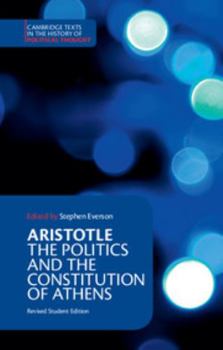Aristotle: The Politics and the Constitution of Athens
(Part of the Cambridge Texts in the History of Political Thought Series)
Select Format
Select Condition 
Book Overview
This new collection of Aristotle's political writings provides the student with all the necessary materials for a full understanding of his work as a political scientist. In addition to a revised and... This description may be from another edition of this product.
Format:Paperback
Language:English
ISBN:0521484006
ISBN13:9780521484008
Release Date:October 1996
Publisher:Cambridge University Press
Length:327 Pages
Weight:1.08 lbs.
Dimensions:0.7" x 5.4" x 8.4"
Customer Reviews
2 ratings
If You Don't Want To Live In A State, You Are Either A God Or A Beast
Published by Thriftbooks.com User , 15 years ago
I read this book for a graduate seminar on Aristotle. Politics is one of Aristotle's most prescient works that had a profound impact on our Founding fathers. Nicomachean Ethics (EN) is part of political knowledge. Politics regulates when virtue does not. Laws are created for people who are not virtuous. Polis= "city or state." Humans live in society, so virtue ethics is not just for individual living, community is a shared project for the good. Aristotle starts with his method, a phenomenological attitude. He starts with pairs, male and female, builds up to ruler and subject, master and slave as a natural relationship, the 1st social community thus is the household. Household is an economic relationship and has monarchy of patriarch. Villages are a collection of households with a king. Then you have a Polis, a fulfilled complete community formed from several villages. Self-sufficiency is the mark of a Polis. An organized social relationship is Polis and a reason is being able to take care of needs of life and promote living well. Only in a Polis can you have art, philosophy, etc. All these are actualized in a Polis. Politics is natural to human life. We are meant to be social. According to Aristotle, "If you don't want to live in a state you are either a God or a beast." Logos= "rationality or language" is what helps us to be political animals. Rational language expands capacity in human life. Since Aristotle thinks the Polis has a telos or an end then the Polis as potential comes even before the household. This is similar to the acorn having the telos to become a mighty oak tree. Politics completes the human condition for Aristotle. Need a Polis to develop other human capacities. Aristotle's hierarchy. Slaves are a living tool for Aristotle. Aristotle argues that some people are meant to be slaves right from birth. "Born to be ruled." Slavish person does not have enough rationality to rule themselves. Aristotle says not every form of actual enslavement is justified according to him. He justifies the human use of animals as a natural act. Aristotle now wants to find what kind of government is best. In a Polis citizens have things in common. Aristotle criticizes Plato's Republic, he finds it to be overly controlling. Socrates says the soul has 3 aspects and so does the Polis. The Soul has: 1. Reason 2. Passion 3. Appetite The Polis has: 1. Philosopher King. 2. Guardians, (military). 3. Commoners. Both are a hierarchal ordering. Socrates and Plato talk about the state holding all property in common. This includes the state raising children after birth instead of the parents, thus there will be no family clans trying to better themselves over their neighbors. Aristotle criticizes this idea. Aristotle says a Polis is a plurality of people thus people are not all the same and a Polis must accommodate differences in people, which actually makes a Polis better. Aristotle criticizes Socrates and Plato's idea
Aristotle's 'Politics' still essential
Published by Thriftbooks.com User , 23 years ago
The Greek philosopher and scientist Aristotle possessed one of the most remarkable intellects of all time. He contributed to the body of knowledge in areas as diverse as logic and biology, ethics and physics, psychology and politics. Although his work 'The Politics' has been widely published, few versions have been as effective as this in placing his political commentary into the conext of his time. Certainly this contextualisation is this edition's greatest strength, and the feature which most clearly sets it apart from most other currently available translations.'The Politics' remains an essential feature in the literature of politics and philosophy. Whether the reader is a first year political science student or a senior lecturer seeking to replace that well-worn second (or third) copy of an earlier edition, the particular book will be the ideal choice.





